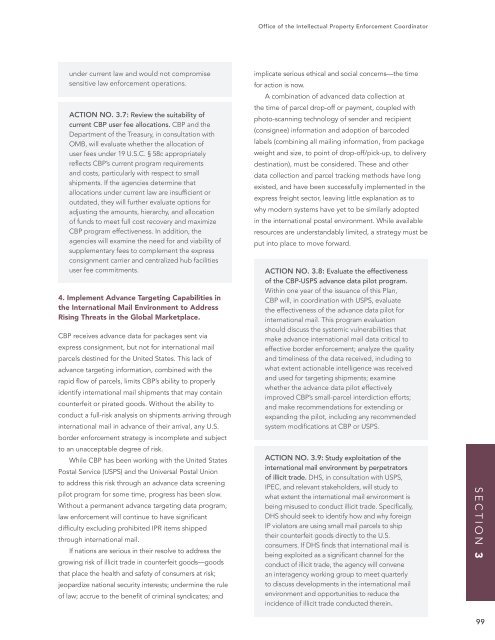ENFORCEMENT
eop_ipec_jointstrategicplan_hi-res
eop_ipec_jointstrategicplan_hi-res
Create successful ePaper yourself
Turn your PDF publications into a flip-book with our unique Google optimized e-Paper software.
Office of the Intellectual Property Enforcement Coordinator<br />
under current law and would not compromise<br />
sensitive law enforcement operations.<br />
ACTION NO. 3.7: Review the suitability of<br />
current CBP user fee allocations. CBP and the<br />
Department of the Treasury, in consultation with<br />
OMB, will evaluate whether the allocation of<br />
user fees under 19 U.S.C. § 58c appropriately<br />
reflects CBP’s current program requirements<br />
and costs, particularly with respect to small<br />
shipments. If the agencies determine that<br />
allocations under current law are insufficient or<br />
outdated, they will further evaluate options for<br />
adjusting the amounts, hierarchy, and allocation<br />
of funds to meet full cost recovery and maximize<br />
CBP program effectiveness. In addition, the<br />
agencies will examine the need for and viability of<br />
supplementary fees to complement the express<br />
consignment carrier and centralized hub facilities<br />
user fee commitments.<br />
4. Implement Advance Targeting Capabilities in<br />
the International Mail Environment to Address<br />
Rising Threats in the Global Marketplace.<br />
CBP receives advance data for packages sent via<br />
express consignment, but not for international mail<br />
parcels destined for the United States. This lack of<br />
advance targeting information, combined with the<br />
rapid flow of parcels, limits CBP’s ability to properly<br />
identify international mail shipments that may contain<br />
counterfeit or pirated goods. Without the ability to<br />
conduct a full-risk analysis on shipments arriving through<br />
international mail in advance of their arrival, any U.S.<br />
border enforcement strategy is incomplete and subject<br />
to an unacceptable degree of risk.<br />
While CBP has been working with the United States<br />
Postal Service (USPS) and the Universal Postal Union<br />
to address this risk through an advance data screening<br />
pilot program for some time, progress has been slow.<br />
Without a permanent advance targeting data program,<br />
law enforcement will continue to have significant<br />
difficulty excluding prohibited IPR items shipped<br />
through international mail.<br />
If nations are serious in their resolve to address the<br />
growing risk of illicit trade in counterfeit goods—goods<br />
that place the health and safety of consumers at risk;<br />
jeopardize national security interests; undermine the rule<br />
of law; accrue to the benefit of criminal syndicates; and<br />
implicate serious ethical and social concerns—the time<br />
for action is now.<br />
A combination of advanced data collection at<br />
the time of parcel drop-off or payment, coupled with<br />
photo-scanning technology of sender and recipient<br />
(consignee) information and adoption of barcoded<br />
labels (combining all mailing information, from package<br />
weight and size, to point of drop-off/pick-up, to delivery<br />
destination), must be considered. These and other<br />
data collection and parcel tracking methods have long<br />
existed, and have been successfully implemented in the<br />
express freight sector, leaving little explanation as to<br />
why modern systems have yet to be similarly adopted<br />
in the international postal environment. While available<br />
resources are understandably limited, a strategy must be<br />
put into place to move forward.<br />
ACTION NO. 3.8: Evaluate the effectiveness<br />
of the CBP-USPS advance data pilot program.<br />
Within one year of the issuance of this Plan,<br />
CBP will, in coordination with USPS, evaluate<br />
the effectiveness of the advance data pilot for<br />
international mail. This program evaluation<br />
should discuss the systemic vulnerabilities that<br />
make advance international mail data critical to<br />
effective border enforcement; analyze the quality<br />
and timeliness of the data received, including to<br />
what extent actionable intelligence was received<br />
and used for targeting shipments; examine<br />
whether the advance data pilot effectively<br />
improved CBP’s small-parcel interdiction efforts;<br />
and make recommendations for extending or<br />
expanding the pilot, including any recommended<br />
system modifications at CBP or USPS.<br />
ACTION NO. 3.9: Study exploitation of the<br />
international mail environment by perpetrators<br />
of illicit trade. DHS, in consultation with USPS,<br />
IPEC, and relevant stakeholders, will study to<br />
what extent the international mail environment is<br />
being misused to conduct illicit trade. Specifically,<br />
DHS should seek to identify how and why foreign<br />
IP violators are using small mail parcels to ship<br />
their counterfeit goods directly to the U.S.<br />
consumers. If DHS finds that international mail is<br />
being exploited as a significant channel for the<br />
conduct of illicit trade, the agency will convene<br />
an interagency working group to meet quarterly<br />
to discuss developments in the international mail<br />
environment and opportunities to reduce the<br />
incidence of illicit trade conducted therein.<br />
SECTION 3<br />
99


